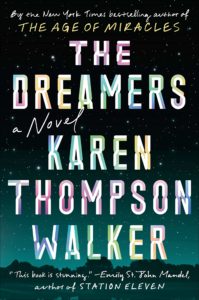2019 has been a good reading year so far!

The Dreamers is Karen Thompson Walker’s second novel, after The Age Of Miracles (reviewed here). I loved her first book, and I loved this one too.
In a small California college town called Santa Lora, a girl in a freshman dorm falls asleep and doesn’t wake up. She goes to the local hospital and they can’t figure out what is wrong with her or why she sleeping so soundly and for so long. Soon, another girl on the same floor also falls asleep, and before long, there are several affected students in the dorm. The school quarantines the kids, eventually moving them to the school gym, but soon the sickness has spread beyond the school to other people living in Santa Lora. The condition – identified as a virus – affects young and old, and the hospital eventually becomes so crowded that the sleepers are housed in libraries and gyms and anywhere where cots and IVs can be set up.
Doctors and nurses caring for the sick catch the virus themselves, and the health facilities become desperately short-staffed. The whole city is quarantined while the worsening situation gains attention worldwide, Businesspeople in town for a conference are marooned when the whole city is walled off, and they eventually fall asleep too. A psychiatrist called in from Los Angeles is barred from leaving, separating her from her young daughter a hundred miles away. Desperate parents wait outside the perimeter for word on their students, while kids in Santa Lora are temporarily orphaned and pets run wild in the streets. Meanwhile the sleepers all share something else in common: while asleep, they dream intensely, their brains registering more signs of activity than ever before recorded.
The virus and public health element of The Dreamers was very interesting, but what I loved about this book was Walker’s treatment of the people affected by the epidemic. The two girls whose survivalist father fell asleep, leaving them to fend for themselves. The couple with a newborn. The professor whose partner was in a nursing home, felled by dementia. Like in The Age Of Miracles, Walker is adept at making the universal extremely personal. She especially treats people in transition – adolescents, new parents, etc. – with keen understanding and sympathy.
The Dreamers was a 4.5 star read, only because the ending is a bit murky. I wondered how Walker was going to end the story, and what its purpose ultimately would be. In the ARC I read, there is an interview with Walker in which her interviewer, the author Karen Russell, says, “Dreams seem to me to be the most honest communication a body can have with itself” (um, YES). As the afflicted wake up from their sleep, they talk about the intense dreams that had and mourn the loss of people who existed only in their slumber. Walker let her characters explore in sleep what was unfamiliar or unknown in their lives, and that was meaningful. But ultimately, I found the rest of the book even more compelling, as her characters had to deal with the effects of the epidemic on their own evolving lives.










About Me
I have been blogging about books here at Everyday I Write the Book since 2006. I love to read, and I love to talk about books and what other people are reading.